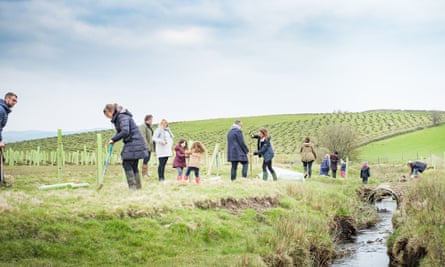When Roger Tempest inherited Broughton Estate at the age of seven, tadpoles flowed from the taps and the main house was so exposed to the elements that in winter the billiard table gathered a light dusting of snow. The family dined in hats and gloves. The land had been given to his ancestors in 1097, in the aftermath of the Norman invasion, when wolves still roamed England. For almost a millennium, these 3,000 acres on the edge of the Yorkshire Dales have mirrored the history of our land: the enclosures, the persecution of predators, deforestation, modern agriculture and the gradual eradication of the wild. Today, Broughton is part of a new conversation about land use that could rewrite the book on what England looks like.
Roger is the 32nd generation, and that weight of history came with a certain responsibility. Astronomically expensive to run and managed by people not predisposed to management, many English estates were being dissolved. But when Roger came of age, he was determined to save the place. It was the late 1980s, and the fax machine was enabling offices to be set up in places hitherto unimaginable. He built a business park in the crumbling barns which breathed new life into the place. Today it houses 52 companies with more than 700 employees. With the estate solvent, other changes became possible, to the extent that it was recently described by Alastair Driver, director of Rewilding Britain, as “the most rapidly transformational” rewilding project in the country.

“That’s probably because we came from such a low base,” laughs Roger. “The fields were billiard tables, nothing but sheep and two species of grass.” We are sitting in the estate’s cafe, Utopia. I am eating a squash and dukkah pancake with a sesame-fried egg on top. A selection of medicinal mushroom lattes and CBD (cannabidiol) drinks are on the menu. Floor-to-ceiling glass looks on to the walled garden where peahens prance and squabble.
“Change is in the air,” says Roger, who turns 60 this year but looks half that. “Everybody’s aware that something isn’t working. I’m not an activist. I just see it as pure common sense.” Since 2020, Broughton has planted 15 species of native broadleaf, a total of 350,000 trees. They have sown wildflower meadows. Soon they hope to reintroduce beavers.
“I’m just trying to do the basics,” he says. “Clean water, clean air, lots of trees, lots of bees. I’m an antidote to urbanisation.”
After lunch, I walk out with Kelly Hollick, Broughton’s rewilding project manager. We pass the pond and wood-fired sauna, following a footpath that will eventually snake for 30 miles across the whole estate. Kelly grew up nearby, passing the gatehouse on the A-road every morning and never giving what was going on behind the walls much thought. But after a few years in London, she came home in search of something else.
At the high point we look out across the Yorkshire landscape. Those bright green fields, the drystone walls, the flecks of sheep. Broughton, at our feet, appears entirely different. “We talk about England’s green and pleasant land,” says Hollick. “England should be brown.”

Already the saplings and resurgent scrub give the land a scraggy, unkempt quality. And with them have returned the butterflies, the micro moths, the hoverflies, the grasshoppers as well. There are so many voles that a photographer recently saw eight barn owls hunting in one field. It is a glimmer of how England might once have looked.
In another four years they will let grazers back in: Tamworth pigs, Exmoor ponies, shorthorn cattle. The intention is to replicate an ancient landscape, a mosaic of meadow, forest and scrub, and the felled and coppiced trees that songbirds favour.
Guests at Broughton can stay in one of 19 cottages in the grounds, or in the main hall itself. It’s a jumping-off point for a holiday, but Hollick hopes that visitors will also use their time here to engage with what is going on around them. Forest bathing, wild swimming, tree planting, species monitoring: there are plenty of ways to immerse oneself in Broughton’s transformation. To see a hare, or a hen harrier, where there were none a year ago, is a very specific form of therapy.
For Roger there is another side to this transformation. Just as the landscape has been tamed by modern agriculture, so has our inner landscape been tamed by modern lifestyles. The Avalon Wellbeing Centre opened in 2018. Ruby Wax, who runs one of 50 annual retreats here, called it “the coolest place I’ve ever been to”. There is scarcely a corner in sight; the stairwells and meditation rooms and shower cubicles all curve, mandala-like, around the building.

The following morning I join Paris, Roger’s partner, for a yin yoga class in an upstairs room called the Nest, followed by some crystal bowl sound healing. We hold poses for long minutes while the sun comes out and small birds flit through the trees that press up against the glass. I am typically sceptical about such things, but splashing around in the pool afterwards I find myself feeling remarkably good.
“We cannot afford to be treating all of our land across the country as single use,” Alastair Driver of Rewilding Britain tells me over the phone, shortly after my return from Broughton. “It’s got to deliver flood risk reduction, better water quality, carbon sequestration, biodiversity, access, health and wellbeing opportunities. All while making sure we still produce enough food to eat.”
The current government, says Driver, is “absolutely intent on ignoring the blindingly obvious”. So to see people and organisations taking a lead, despite policy, is the hope we need right now. I leave Broughton buoyed up by a sense of the possible, which is not bad for a short break away.
Accommodation was provided by Broughton Sanctuary. A stay in Ivy Cottage, sleeping two, starts from £173 a night, based on a minimum three-night stay, or from £725 for a week
 Top Naija News: Nigerian News, Breaking News Nigeria and World News Top Naija News is a daily news publication in Nigeria, delivering the latest breaking news in Nigeria and around the world.
Top Naija News: Nigerian News, Breaking News Nigeria and World News Top Naija News is a daily news publication in Nigeria, delivering the latest breaking news in Nigeria and around the world.



